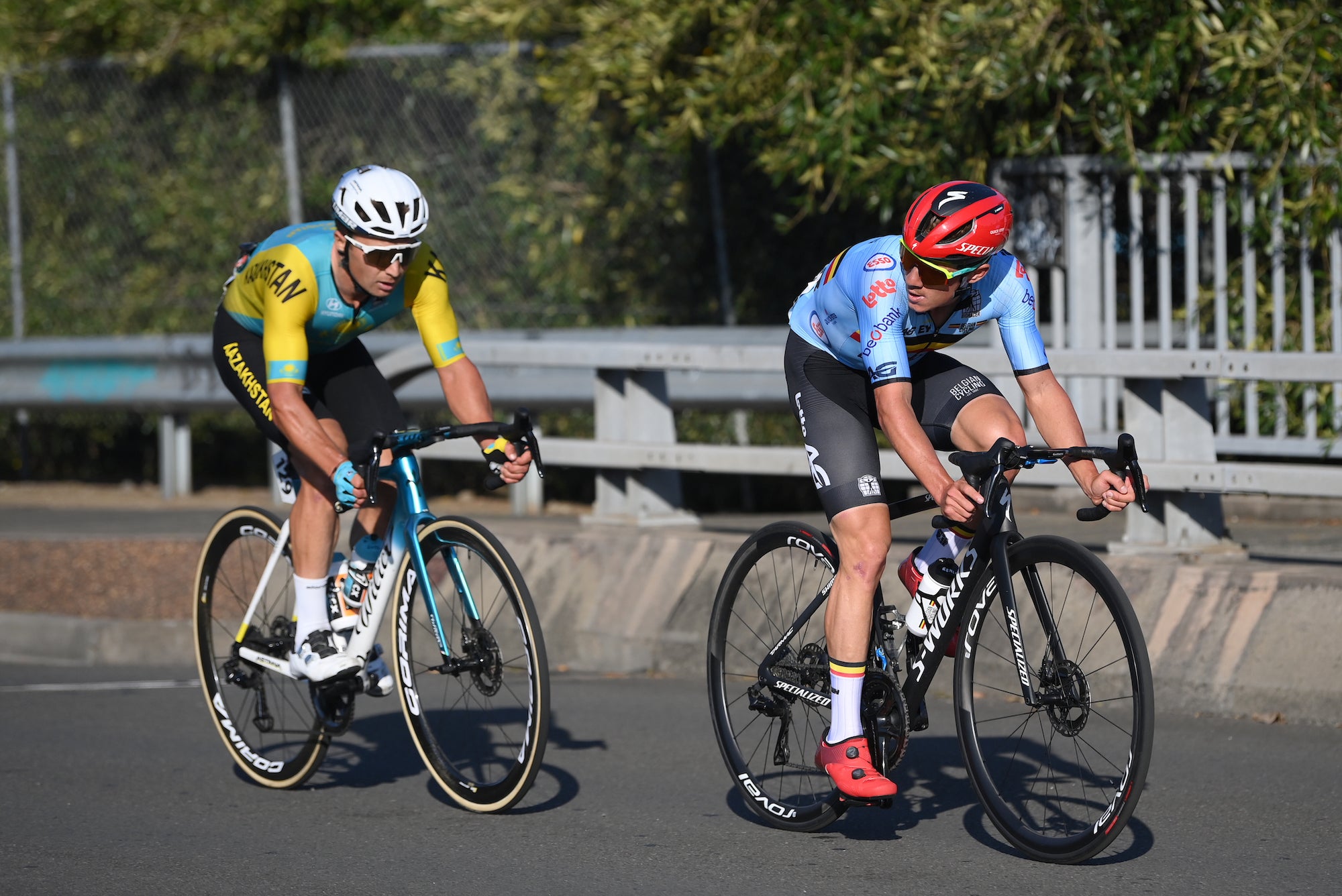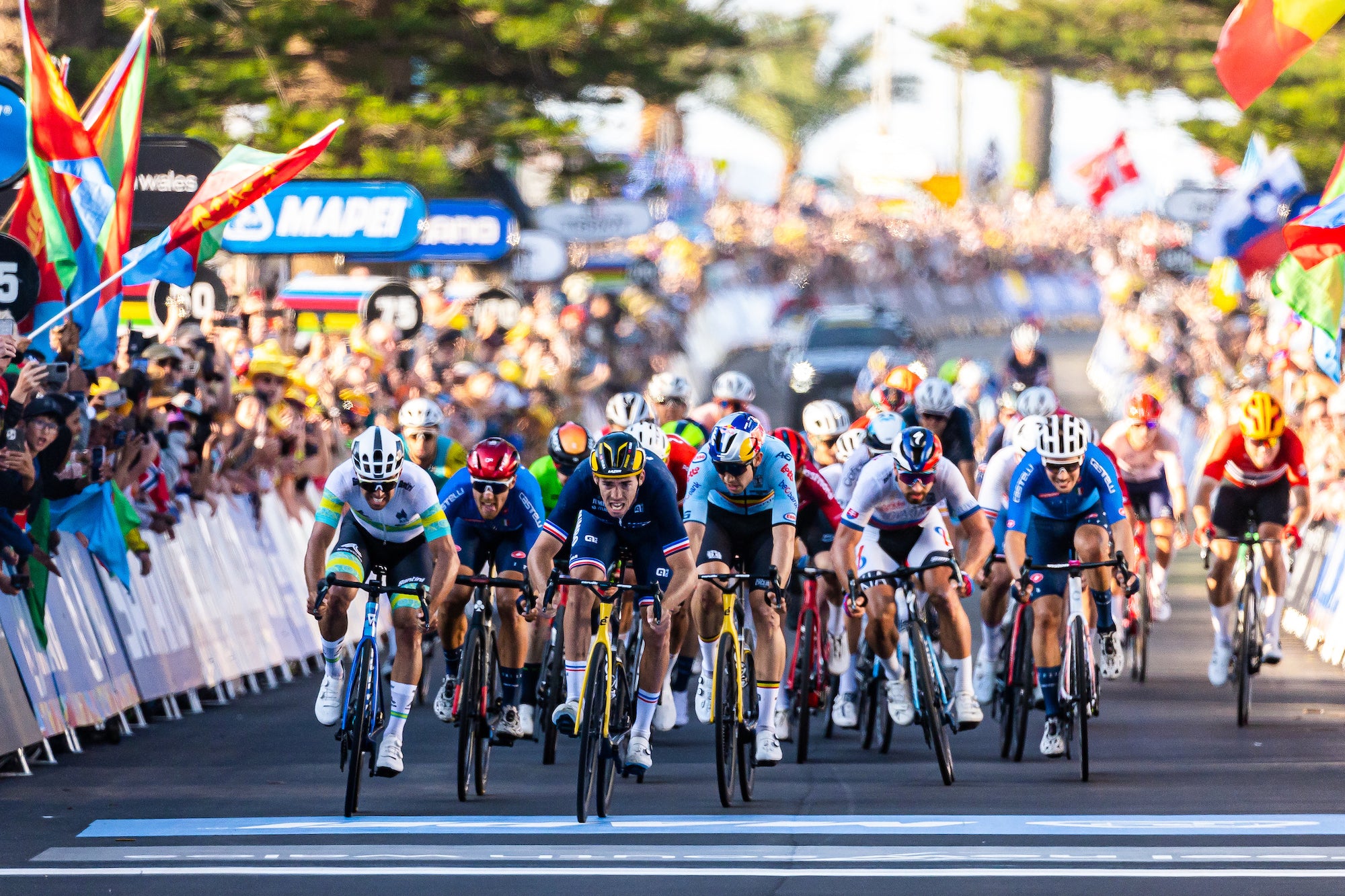When Remco Evenepoel first started trying to fly out of the front group and go all-in on a solo attack with four laps and over 60km of the Wollongong circuit still to ride, it was tempting to think he was being overzealous. Received wisdom has it that the elite road race of the World Championships is an attritional affair, a slow-burner in which none of the really significant moves are made prior to the final lap, and a long slog in which over excursion too early in the race will be punished later down the line.
But men’s cycling is changing, and the new young elite who have taken over the peloton over the last few years play by a whole different rule book. As one of the vanguards of this new generation, Evenepoel knew exactly what he was doing, and understood that all he needed was a few bike-lengths over the other riders in the breakaway to break the elastic and ride solo to likely victory, however far away from the finish he made the move. After all, he won Liège–Bastogne–Liège by going clear 30km from the finish, and San Sebastian from even further out, at 44km.
So when at last he got his desired gap 35km from the finish to go clear with Alexey Lutsenko (Kazakhstan), then found himself solo after Lutsenko ran out of steam on Mount Pleasant 10km later, victory felt like an inevitability.
 When Evenepoel attacks like this, the only other rider in world cycling that can compare is Annemiek van Vleuten, winner of the women’s road race the day before. The way he gets his head down and commits to the attack, and is able to keep accelerating over and over again until breaking anyone who tries to stay on his wheel, is certainly reminiscent of the way the Dutchwoman regularly wins races; as is the look of both panic and exhaustion of those who try to follow. Everyone knew the threat posed and the damage Evenepoel could do if let out of their sight, and watched him like a hawk. Yet despite their attention, and hardly cutting an inconspicuous figure decked out in the red helmet and shoes marking his recent Vuelta a España victory, he still managed to power himself clear nonetheless.
When Evenepoel attacks like this, the only other rider in world cycling that can compare is Annemiek van Vleuten, winner of the women’s road race the day before. The way he gets his head down and commits to the attack, and is able to keep accelerating over and over again until breaking anyone who tries to stay on his wheel, is certainly reminiscent of the way the Dutchwoman regularly wins races; as is the look of both panic and exhaustion of those who try to follow. Everyone knew the threat posed and the damage Evenepoel could do if let out of their sight, and watched him like a hawk. Yet despite their attention, and hardly cutting an inconspicuous figure decked out in the red helmet and shoes marking his recent Vuelta a España victory, he still managed to power himself clear nonetheless.
The big question is how Evenepoel was able to get into such an early breakaway in the first place, that was missed by so many of the other top favourites? He went clear from the peloton as part of a group around 20-rider strong that got a gap on the eighth ascent of Mount Pleasant, 77km from the finish. Most of the major nations were represented, but, crucially, by riders who were neither their leaders, nor in the same league as Evenepoel. Quentin Pacher and Romain Bardet were there for the French, but not Julian Alaphilippe; Jan Tratnik for Slovenia, but not Tadej Pogačar; Pascal Eenkhorn for the Dutch, but not Dylan van Baarle; Nicola Conci and Lorenzo Rota for Italy, but not Alberto Bettiol; and Jake Stewart and Ben Tulett for the Brits, but not Ethan Hayter. Add to that the fact that Evenepoel also had Belgian teammates Pieter Serry and Quinten Hermans in the group to assist him, is it any wonder he managed to win with such ease?
Part of this mistake on the behalf of the other teams must be ascribed to just how chaotic and confusing a race this was almost from the flag. Playing by the same playbook that brought them such success last year, the French were once again responsible for setting the race ablaze, and were intent on making the race as aggressive as possible. They went hard on the Mount Keira climb despite it being crested nearly 200km from the finish, and immediately engineered a dangerous situation in which their quartet of Valentin Madouas, Romain Bardet, Pavel Sivakov and Bruno Armirail were joined by top favourites like Tadej Pogačar and Wout van Aert. This group was still had a sizable gap over the peloton when they reached the finishing circuit for the first time, with Pogačar leading ominously the first time up Mount Pleasant, and the French continued being aggressive, with Sivakov going clear with four other riders.
Eventually everything came back together, but it meant that when the Evenepoel group did go clear 77km from the finish, there was nothing especially distinct about it to cause alarm, but rather a continuation of the pattern the race had already taken. Where the other nations really lost the race was in their failure to commit to a chase once this group had gained a big gap. There seemed to be a belief among most that so long as they had representation up the road, even if it wasn’t by one of their stronger riders, then they should not chase, so it was left mostly to the Germans, who had no-one in the lead group, to do most of the work. With so little firepower in the chase, the Evenepoel group’s gap quickly ballooned up to over two minutes, effectively giving the Belgian a huge head-start over all of his main rivals once he made his solo move 35km from the finish.
Ultimately, the peloton even nearly missed out on taking any of the medals, not just gold. Inside the final kilometre, a chasing group behind Evenepoel made up of remnants of the break (Lutsenko, Mauro Schmid, Lorenzo Rota and Mattias Skjelmose) remained clear of the peloton, and may have swept up silver and bronze had they not eased up and played games ahead of the sprint.
 Instead, the peloton just caught them in time, allowing Christophe Laporte and Michael Matthews to sprint for second and third respectively. Laporte’s result means it was a good day after all for the French, even if their strength in numbers proved to be ineffectual against a force as strong as Evenepoel, while a bronze for Matthews on home roads during what was such a tough Worlds should be seen as a great result for a rider who no doubt would have preferred a quieter, more sprinter-friendly race.
Instead, the peloton just caught them in time, allowing Christophe Laporte and Michael Matthews to sprint for second and third respectively. Laporte’s result means it was a good day after all for the French, even if their strength in numbers proved to be ineffectual against a force as strong as Evenepoel, while a bronze for Matthews on home roads during what was such a tough Worlds should be seen as a great result for a rider who no doubt would have preferred a quieter, more sprinter-friendly race.
But for a variety of reasons, it wasn’t the day for any of the other top pre-race favourites. Wout van Aert stayed on the backfoot while teammate Evenepoel set about winning, ultimately springing for a fourth-place finish; defending champion Julian Alaphilippe left it to his French teammates to make the attacks, and didn’t have the legs to stay in the peloton on the final lap; Pogačar faded towards the end of the race, perhaps tired from his earlier excursions; the pace proved too much for Biniam Girmay, who was dropped on the final lap; and Mathieu van der Poel’s chances were ruined before the race had even began in bizarre circumstances, after he spent much of the night before in a police station after being charged with assault.
At different points in the season, each of these might have had a case to be considered the top men’s rider of 2022. But after this result, there really is only one candidate: Remco Evenepoel.






























